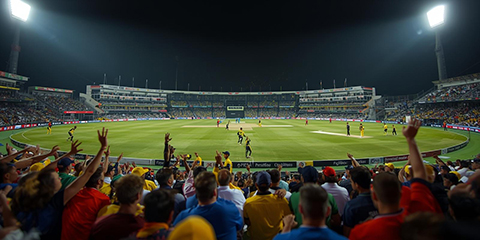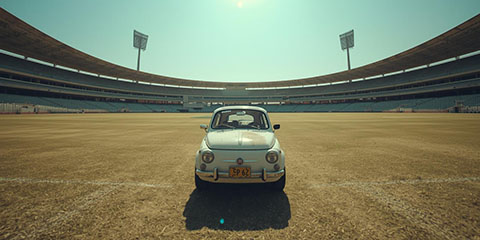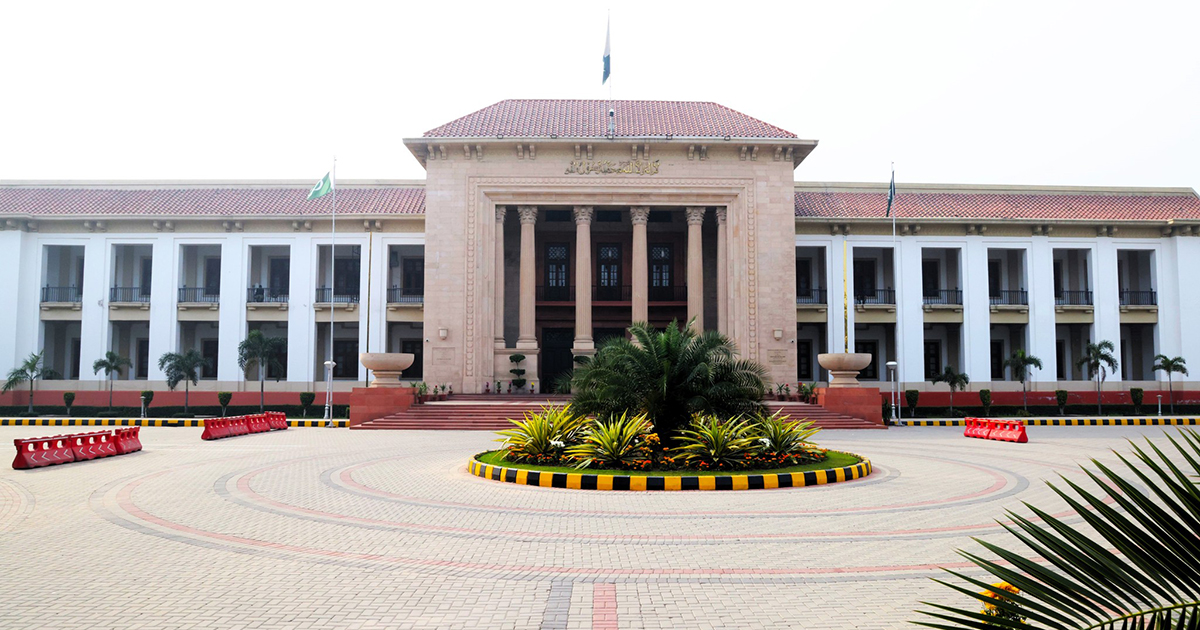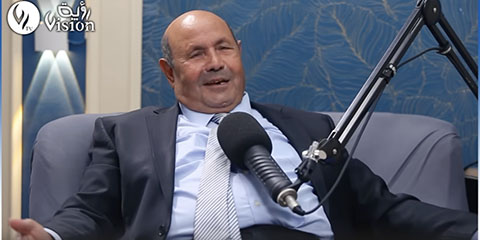Sheikh Mohammad Naqi: Pakistan's legendary hockey commentator who became the voice of a nation
JournalismPakistan.com | Published 3 months ago | Dr. Nauman Niaz (TI)
Join our WhatsApp channel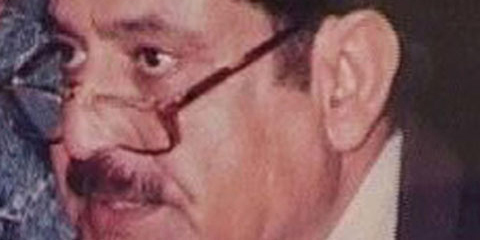
ISLAMABAD— In countries such as ours, images dreamt of more often than fully realized, where the past clings with the fervour of an elder clutching old medals, greatness has often come unannounced. Not with trumpets or a red carpet, but gently, like the evening call to prayer across the rooftops of Lahore or Karachi, so much a part of the soundscape that we only notice its absence when it falls silent.
When Pakistan Performed Hockey Like Ballet on Turf
There was a time, not so very long ago, though history hastens to tell us otherwise, when Pakistan did not just participate in hockey; it performed it. A ballet on turf, a defiance of depth and logic. The players were magicians, yes, but the enchantment came not only from what they did with the stick and ball. It came too from the voice that told us what was happening, long before television screens flickered into being across living rooms and drawing rooms.
The Voice That Conjured Hockey Through Radio Pakistan
In the mellow, crackling tones of Radio Pakistan, and later through the flicker of PTV's grainy broadcasts, there came a voice. Not of triumph alone, but of passion, pain, and lyricism. A voice that conjured the game before our eyes as if by incantation. That voice belonged to Sheikh Mohammad Naqi, S.M. Naqi to his companions, colleagues, and an entire nation of listeners. He was neither a sportsman nor a statesman. He did not carry the stick, nor did he wear the green. But he carried something else, the weight of expectation, the burden of translation between movement and meaning. And in doing so, he became, in the truest sense, Pakistan's hockey bard.
How Sports Commentators Are Remembered Through Their Craft
There is a way in which commentators are remembered. Their craft, ephemeral by nature, vanishes the moment the final whistle blows. Their words are rarely archived, their phrases mostly lost. But every now and again, one emerges whose voice so thoroughly embodies a sport, an era, a collective feeling, that to recall the game is to summon their cadence.
Naqi was one such man.
The Humble Beginning of Pakistan's Greatest Sports Voice
He began modestly, without the trappings of a modern media education, without any studio polish. In the 1960s that era of burgeoning identity when Pakistan still believed itself to be writing a bold new phase of history, Naqi joined Radio Pakistan. There was nothing flamboyant about his entry. He arrived not like a comet, but like the morning breeze through the open windows of a railway carriage: unassuming, honest, familiar. His love of hockey preceded his broadcast career. He had himself played the game, albeit at the junior level, enough to know its angles and dynamics, to speak its dialect. And so, when he later described a deft pass or a sudden flick, it came not as conjecture but recollection. He knew the weight of the stick, the feel of the ball against the blade, the pressure of a crucial penalty corner.
The Poetry of Sports Commentary: Showing How It Felt
But Naqi's genius was not in knowing what had happened; it was in showing us how it felt.
He was no stenographer of sport. He did not sit in a press box reciting facts. Instead, he was a kind of poet laureate to Pakistani hockey's golden age, setting each match to verse, sometimes euphoric, sometimes elegiac. And always in Urdu, his beloved language. His commentary had a rhythm to it, a cadence you might call literary. He was, in that sense, a romantic, less concerned with precision than with truth. Emotional truth, that is, which in sport counts for more.
Islahuddin Siddiqui Remembers the Pioneer of Urdu Hockey Commentary
Islahuddin Siddiqui, himself a colossus of the game, recalled Naqi's gift with a fondness tinged by sorrow. "Naqi was a great commentator," he said. "He was the pioneer of Urdu commentary for hockey. It saddens me to know he is no more, because all I can remember is that he felt every emotion like we did during the matches. I still remember his voice would start to break whenever he would see the team lose the match." That break, that audible tremor of grief did not signal a failure of professionalism. It was, in its own way, the highest form of it. To remain unmoved while narrating a nation's sporting rise or fall is not neutrality; it is detachment. Naqi, on the contrary, was entangled in every game. He rode the wave of every counterattack, winced at every missed opportunity, and broke, audibly and palpably, when the final hooter brought bitter news. Naqi's commentary was not commentary at all. It was communion.
Pakistan Hockey's Golden Era Through Naqi's Voice
From the 1960s to the 1980s, the nation listened, not with ears alone, but with hearts. These were years when Pakistan stood atop the hockey world. Olympic golds, World Cup titles, and Asian Games glory followed one another like a royal procession. And always, Naqi's voice marched alongside.
The Trusted Voice in Hockey's Inner Sanctum
He was granted what few are: access not just to the arena but to the inner sanctum. He travelled with the team, knew their fears and confidences, watched them cry in quiet corners and rejoice under floodlights. And the players trusted him, not because he was powerful, but because he was kind. There was no malice in Naqi, no appetite for scandal. He was a raconteur, not a critic. He wanted only to understand, and then to translate. One imagines him, notebook in hand, eyes bright behind rimmed spectacles, strolling beside the team bus in Madrid or Melbourne, soaking in the moment not as a journalist seeking headlines but as a witness to something worth preserving. His words, once broadcast, were like garlands placed gently around the necks of those who wore the crescent proudly on their chests.
Beyond Hockey: A Multi-Sport Broadcasting Legend
And yet, Naqi was not parochial. Though hockey was his temple, he entered other sanctuaries too. Cricket, boxing, and athletics, he covered them all. Not because he wished to be versatile for show, but because he believed, with the sincerity of an old-school sportsman, that every contest deserved its chorus. And when producers found themselves in crisis, a last-minute change, an unwell host, it was Naqi they called. Always ready, always composed, always committed.
The Timeless Quality of Urdu Sports Commentary
He had, in him, a certain timelessness. He never chased novelty, and yet he never seemed out of date. He remained loyal to Urdu commentary even as others pivoted to English, his diction clear and elegant, his metaphors drawn from the soil of the land itself. He democratized sport, bringing it from the elite schools to the street corners, from high-rise lounges to the radio sets of rural Punjab and Sindh. As a colleague once remarked, he made the game feel not like a foreign import, but a local inheritance.
The Gentleman of Pakistani Sports Journalism
Off the mic, he was just as singular. There was something about Naqi, a gentleness, perhaps, or a quiet dignity that disarmed even the most combative of newsrooms. "He was always smiling," said Siddiqui. "I never saw him fight with anyone in over three decades that I've known him." In an era when media began to discover its bite, when cynicism began to replace sincerity, Naqi remained unchanged. He was the kind of man who stood up when an elder entered the room, who never missed a funeral, who sent fruit baskets to ill friends without leaving a name.
The Karachi Press Club Legacy and Disappearing Fraternity
Even as illness crept into his bones and withdrew him from public view, he remained present in memory. At the Karachi Press Club, in that smoke-wreathed card room of old where memories are passed like playing chips, his absence was often the topic of conversation. One could almost hear his laugh echo down the corridor, or expect his hand on the shoulder after a pointed remark. Like Farooq Mazhar or Zakir Syed, he was part of that disappearing fraternity — men who believed journalism to be a public trust, not a performance.
The 2003 Pride of Performance Award Recognition
In 2003, the state, in a rare act of clarity, recognised his contribution with the Pride of Performance. It was, by then, long overdue. But one imagines Naqi accepting it with the same humility he had accepted so much in life, as if it had been meant for someone else. He would have smiled, affirmed, and returned quietly home, perhaps listening to an old match on cassette or re-reading a newspaper column from decades past.
Measuring the Life of a Sports Broadcasting Pioneer
For what was S.M. Naqi if not a repository of history, not the grand, official history of dates and decrees, but the living history of afternoons under foreign sun, of tense final quarters, of thousands of miles travelled not for fame but for love? And now, as we pause to remember him, we find ourselves wondering: how does one measure a man like this?
Not by trophies did he play. Not by headlines, he did not chase them. Not even by recorded tapes, for few, if any, remain. No, Naqi is measured in reverence. In the hushed tones with which his name is still uttered by former players, in the memories of fathers who gestured to the radio dial and said, "Listen, that's Naqi sahib, he'll tell you how the game is going." He is measured in influence, in the voices he inspired, in the sentiment he embodied. He did not simply describe the game. He preserved its soul. And so now, in the silence that follows the end of a life lived for others, we strain to hear him again. That voice, low, deliberate, quivering only.
The Voice That Never Fades: Pakistan's Hockey Heritage
Some voices never fade with the years, which seem to linger in the ear long after the tape has stopped turning, long after the radio has been switched off. They settle into memory not as sound alone but as feeling, as heritage. Pakistan's hockey was blessed with such a voice, one that seemed born not for performance but for belonging. He was the man who first clothed the game in Urdu, who gave it the texture of the people's own tongue. With that, he altered the country's relationship with its national sport, drawing into its fold not only the learned but the rickshaw driver, the shopkeeper, the boy in the schoolyard, the farmer at the edge of his field. To all, he gave the game in their own rhythm, their own cadence.
The Literary Beauty of Naqi's Urdu Commentary Style
His Urdu was neither pedantic nor forced; it was supple, rich in colour, familiar to the ear, and yet never lacking in dignity. He described the penalty corner as though it were the rising of the moon, and a goalkeeper's desperate dive as though it were a fable of survival. Through his commentary, hockey ceased to be a spectacle limited to the few and became instead part of the shared imagination of a nation. He brought to it not just the tongue of the people, but their expression.
From Umpire to Commentator: The Authority Behind the Voice
It must not be forgotten that he had himself been an umpire, standing in the white heat of competition, charged with guarding fairness when passions burned at fever pitch. That vantage point lent his words authority without arrogance, insight without pedantry. He was able to explain the raised hand of the referee, the advantage played, the nuance of whistle and stick, not with the detachment of a schoolmaster but with the gentle patience of a man eager to share knowledge. He demystified the game, yet never stripped it of magic.
The Perfect Radio Voice That Painted Pictures
The instrument of his greatness was his voice. Deep, textured, resonant, it carried with it a natural gravity that never overpowered but instead caressed the game into being. He had about him a casual manner, yet his speech rose and fell with the action: the pitch lifted as a forward burst into the circle, and softened to a near-whisper when play idled in midfield. It was a flow suited perfectly to radio. For those who listened on transistors across Pakistan, his words were more than accompaniment; they were the very sight of the game. Listeners swore they could see the ball flashing from stick to stick, the goalkeeper sprawling in vain, the crowd surging to its feet. He painted not only a description but an image, and his commentary became a vision. On television, he seemed almost too human, too intimate, but on radio, he was in his element, and the stage was entirely his.
The Humble Man Behind Nine Olympic Games Coverage
Yet more memorable than the voice or the knowledge was the man himself. Here was one who had covered nine Olympic Games, who had walked the press boxes of Munich and Moscow, and still would sit with a boy at a tea-stall and speak with the same attention he might offer a federation president. He carried his achievements lightly, never with pride of place but always with humility. His conversations were gifts of time, never hurried, never perfunctory. To the young, he was encouragement; to the old, he was respect.
The Emotional Truth of Pakistan's Sports Commentary
He wept when Pakistan triumphed and wept again when they fell short. There was no artifice in his emotion, no attempt to hide behind the mask of professionalism. He held Pakistan's cadence close to his heart, and in doing so he mirrored the very soul of his country, capable of pride and sorrow in the same breath, willing to show vulnerability.
Weaving History Into Every Match Commentary
His genius lay, too, in the seamlessness of his narrative. He could shift from the right-winger cutting in at speed to a memory of Pakistan's glory at Rome or Amsterdam, from the present moment into the nation's storehouse of triumphs, and back again without break. In this, he gave his commentary the texture of history itself, each game not an isolated contest but part of a longer story, a chapter in a greater tale.
The Gift of Connection: Making Listeners Feel Present
Those who listened often remarked that he made them feel not as though they were being told of a match but as though they were present at it, shoulder to shoulder with the crowd. He did not speak down to his listeners, nor did he speak over them; he spoke with them, as though they were friends sharing the same seat, the same thrill, the same sigh of disappointment. It was a gift of style, of connection, of humanity.
A Legacy Beyond Statistics: The Sound of Pakistan's Soul
And so his legacy rests not in the brittle records of statistics or the faded paper of scorecards, but in the echo that lives still in memory. He was a commentator, yes; an umpire, too; a journalist of wide repute. But above all, he was the voice that gave hockey to a people, that made it something to be seen even with closed eyes. He was the sound of Pakistan's cadence, deep and unique, casual and emotional, a sound that has outlasted time and remains, for those who heard it, unforgettable.
The Final Farewell at Sultan Masjid Karachi
And so, at Sultan Masjid in Karachi's Defence Housing Authority, after the hush of Zuhr prayers, they gathered to bid farewell to S.M. Naqi. Sportsmen, broadcasters, colleagues, and friends stood shoulder to shoulder, paying tribute in silence where words would have faltered. Among them were Wasim Bari, steadfast as ever; Yawar Mehdi, voice of the airwaves; and Professor Ejaz Faruqi, keeper of cricket's chronicles. Yet the absence of any prominent Olympian, and the silence of the Pakistan Hockey Federation, seemed to cast its own muted shadow—a reminder of how easily institutions forget those who once lifted them.
The Custodian of Memory: Nine Olympics and Beyond
Naqi had been more than a witness; he was a custodian of memory, a chronicler who had borne the honour of covering nine Olympic Games, beginning with the tragic splendour of Munich in 1972. He had stood not only with pen in hand but whistle at the lips, an umpire on the hockey fields of Pakistan, a supervisor of championships, a man of the game as much as of its story. In his commentaries, he had lent cadence to the sport; in his journalism, he had given it record and permanence.
Remembering an Iconic Figure of Pakistani Hockey and Sport
As Azeem Sarwar recalled, he was an iconic figure, one who carried the flame of Pakistani hockey and sport through decades of triumph and decline. The condolences of Samiullah Khan, Iqbal Qasim, and Siraj Bukhari came like the last notes of a hymn. And thus Naqi passed, leaving behind more than memory; he left a silence that is felt most keenly where once his voice gave life. Like all true chroniclers, he is best remembered not in the cold ink of statistics, but in the warmth of a nation's listening ear, now made poorer by his absence.
Dr. Nauman Niaz is a civil award winner (Tamagha-i-Imtiaz) in Sports Broadcasting & Journalism, and is the sports editor at JournalismPakistan.com. He is a regular cricket correspondent, having covered 54 tours and three ICC World Cups, and having written over 3500 articles. He has authored 15 books and is the official historian of Pakistan Cricket (Fluctuating Fortunes IV Volumes - 2005). His signature show, Game On Hai, has been the highest in ratings and acclaim.









